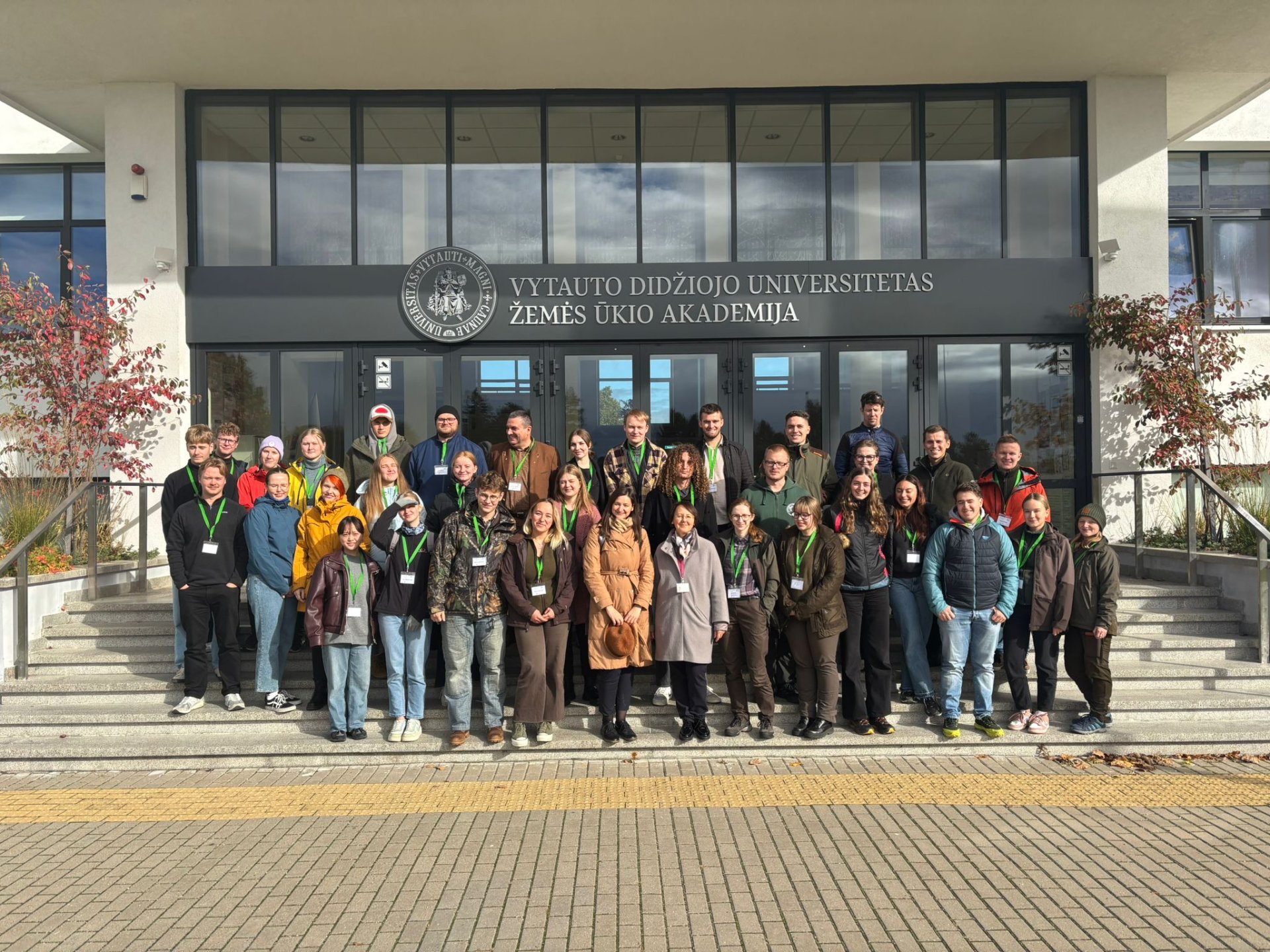Erasmus BIP Courses at VMU Agriculture Academy, Faculty of Forest Sciences and Ecology: International Experience in Wildlife Management through Closer-to-Nature Forestry Principles

From October 13–17, the Faculty of Forest Sciences and Ecology at Vytautas Magnus University Agriculture Academy (VMU AA) hosted the Erasmus+ blended intensive programme (BIP) “Wildlife in Closer-to-Nature Forest Management.”
This international initiative brought together 31 students from eight foreign universities – the Czech University of Life Sciences in Prague, Latvia University of Life Sciences and Technologies, Poznań University of Life Sciences (Poland), South-Eastern Finland University of Applied Sciences (Xamk), Transilvania University of Brașov (Romania), University of Helsinki (Finland), University of Milan (Italy), and Gifu University (Japan).
Topical Issues and a Modern Approach to Wildlife Management
The aim of the programme was to provide students with theoretical and practical knowledge on the protection and management of wildlife in forest and agricultural ecosystems, balancing human activity with natural processes.
The course covered current topics – from the management of large carnivore populations and human–wildlife conflicts to invasive species control and the implementation of nature-based solutions.
On the first day, participants were welcomed by Assoc. Prof. Dr. Rytis Skominas, Director of the Bioeconomy Research Institute, and Prof. Dr. Vitas Marozas, Dean of the Faculty of Forest Sciences and Ecology.
Lectures were delivered by both VMU AA and partner university lecturers, including Dr. Edgars Dubrovskis (Latvia), Assoc. Prof. Dr. Ivana Tomášková (Czech Republic), Prof. Dr. Ovidiu Ionescu and Dr. Darius Hardalau (Romania), as well as Dr. Michael Manton, Prof. Dr. Gediminas Brazaitis, Lect. Mindaugas Bakševičius, Assoc. Prof. Dr. Anželika Dautartė, and others.
Learning in Nature – from Punia Forest to Educational Hunting Grounds
During the course, three educational field trips were organized – to the Punia Forest and the Žuvintas Biosphere Reserve, to the LSMU Wildlife Rescue Centre, and to the VMU AA educational hunting grounds in Bargailiai, where students learned about Lithuanian hunting traditions and wildlife protection practices.
According to participants, these experiences were not only informative but also emotionally impactful – many described them as the most memorable and meaningful part of the entire course.
Student Insights: Intensive but Valuable Experience
According to the student feedback survey, most participants highly evaluated the quality of lectures, the lecturers’ expertise, and the overall course organization.
While some students mentioned that the programme was very intensive, the majority acknowledged that the time allocated for lectures, group, and individual work was well balanced.
Participants also emphasized that the course helped them understand differences in wildlife management across European countries, broadened their perspectives on the social and ecological aspects of nature conservation, and encouraged cultural exchange and collaboration.
“It was an exceptional experience – both in terms of learning and interacting with students from across Europe. Exploring Lithuania’s environment, listening to lecturers’ insights, and engaging in practical activities left a lasting impression,” wrote one student in the anonymous survey.
Final Projects and Results
During the course, students presented group projects on wildlife management systems in their respective countries and on pre-assigned topics related to human–nature interactions.
These presentations demonstrated how various countries apply innovative approaches to maintaining a balance between human activities and biodiversity conservation.
The programme was implemented according to the Erasmus+ Blended Intensive Programme (BIP) model, combining an online introductory session with a week of on-site lectures and practical activities.
The course was organized by Asst. Dr. Jolanta Stankevičiūtė from the Faculty of Forest Sciences and Ecology, and coordinated by Dr. Monika Medikienė, International Coordinator at the VMU Agriculture Academy.
Co-Funded by the European Union. Views and opinions expressed are however those of the author(s) only and do not necessarily reflect those of the European Union or the European Education and Culture Executive Agency (EACEA). Neither the European Union nor EACEA can be held responsible for them.













